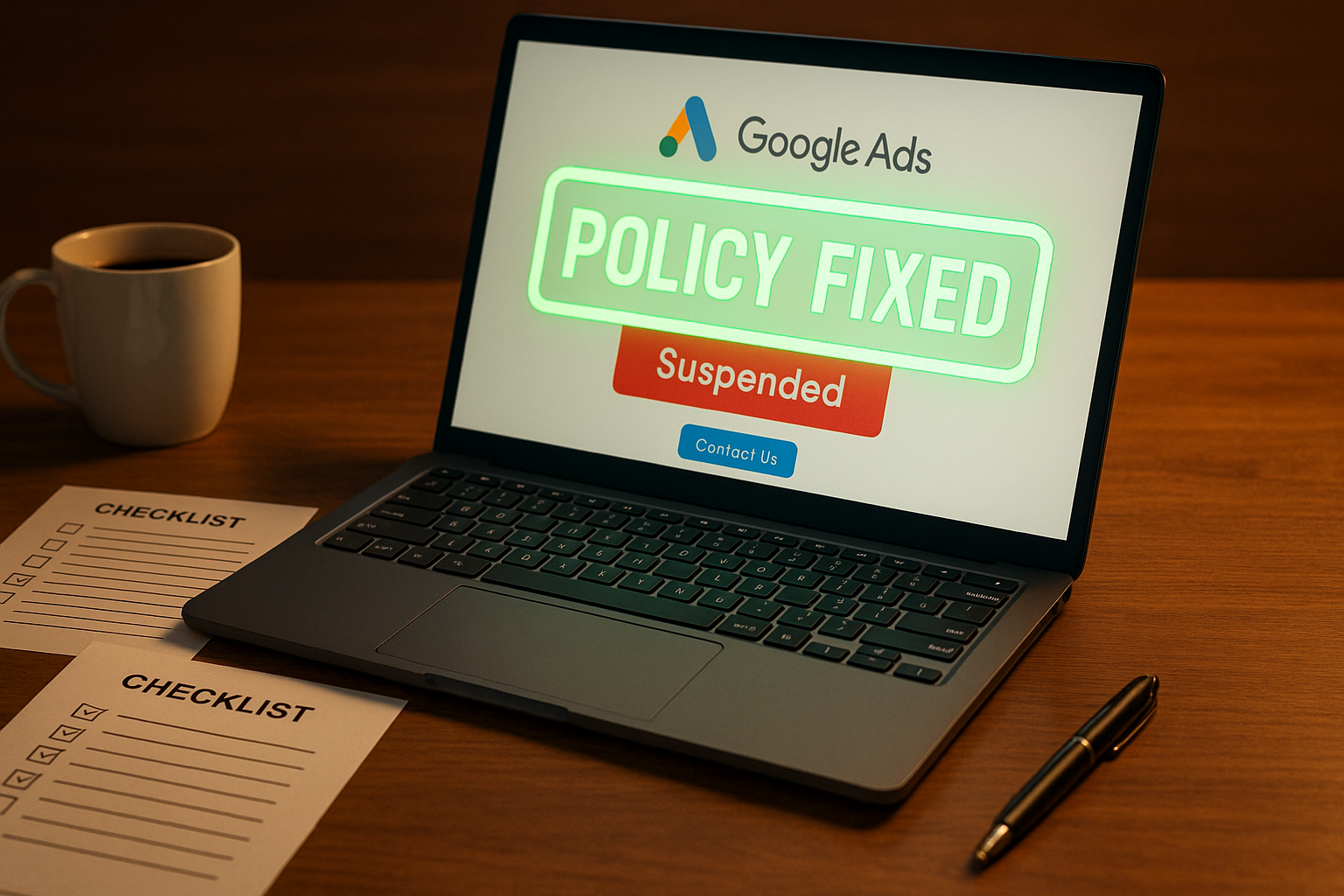Getting suspended from Google Ads is a frustrating experience that can leave even the savviest advertisers scratching their heads. In this blog post, we delve into the world of Google suspensions, shedding light on some of the most common questions and challenges faced by advertisers seeking to navigate this intricate terrain.
Premier Google Partner: A Multifaceted Resource
At the forefront of resolving Google suspensions and policy violations stands a premier resource—the top-tier Premier Google Partner advertising agencies. However, these agencies do more than just advertising. They also specialize in navigating the intricate maze of Google compliance. StubGroup has carved out a prominent position in this realm. With our reputation as an industry leader, we not only excel in advertising but are also a go-to solution for businesses looking to untangle the complexities of Google suspensions.
Cancelling a Google Ads Account
Google’s historical record system makes it more complex than a simple “cancel and restart” approach. While there is an option to deactivate an account, this doesn’t erase the account’s history or underlying issues. It’s more of a signal to Google that the account is not actively in use. Saving login information is extremely important when it comes to Google Ads accounts, even for deactivated accounts, as they may be needed in the future. We have seen this become an issue for suspended accounts and being able to login to old accounts is vital for our team.
The Elusive Quest to Contact Google Support
Often, suspended accounts find themselves deprived of direct phone or chat support. On top of that, Google has a limited support structure. When you do manage to reach a support team member, they might have limited knowledge about the specifics of your suspension and be unable to assist your query directly. The actual suspension details are typically held by Google’s policy or trust and safety teams, rendering the front-line support unable to provide granular information. This is why they will direct callers to the email option in their Help Center.
Human vs. AI in Suspension Appeals
When it comes to the review process for suspension appeals and whether or not it is a human or an algorithm that reviews them, we at StubGroup say it’s a mix of both. Google uses automation for some appeals while they manually review others. Due to this unknown, it is important to craft appeals that address both AI and human perspectives. This makes it so that either AI or human would agree that the issues were fixed in the account and that everything aligns with Google’s criteria for reinstatement.
Unpaid Balances and Suspensions
Users often find themselves unable to pay balances after suspension or facing claims of unpaid balances they don’t owe. It’s a frustrating truth—Google sometimes doesn’t allow payments after a suspension, and resolving unpaid balances requires diligent detective work. Multiple factors, such as accounts with the same payment method or unauthorized account creation, can contribute to these situations. Unfortunately, if Google will not let you pay the remaining balance, you have to work on getting the account unsuspended in order to get the permission to pay it off. There is no way around this and Google support can’t help until the suspension is lifted.
Now, sometimes accounts can be suspended for an Unpaid Balance and not actually have a balance in the account. The most common reason for this is that there is an unpaid balance in another ad account out there that shares the same payment method. That ad account will need the balance paid off before the other can be unsuspended. This is one of the many reasons why it’s important to save login information across ad accounts.
Suspensions and Competitors
At StubGroup, we have seen this maddening scenario all the time: where advertisers are suspended while their competitors seem to operate without hindrance. Google’s enforcement can be inconsistent. While some advertisers might engage in similar practices or be advertising the same products, they might not face the same consequences. We advise highlighting competitors’ actions when building a case to present to Google. However, it’s important to focus on resolving the suspension rather than solely relying on this argument.
If you are facing this situation, you may have to make changes that your competitors do not. While it may seem unfair, a suspended ads account is always under scrutiny. Being under Google’s microscope, it is important to fix or remove anything that could be contributing to the suspension for the appeal process, even if your competitors don’t have to.
Google Merchant Center Suspensions
Google Merchant Center can be suspended on its own, or alongside Google Ads, and either situation is equally frustrating. Google Merchant Center has its own set of policies, so our experts examine different aspects when resolving issues and preparing the account for Google’s review. Our approach varies depending on whether the Google Ads account is also suspended. Frequently, one needs to be unsuspended before the other.
The most common reason for suspension in Google Merchant Center is Misrepresentation. This policy encompasses a wide range of reasons for an account to be suspended, making it challenging for advertisers to navigate and comply with Google’s policies. This is an area in which we at StubGroup are well-versed and can assist advertisers in understanding. If you are grappling with a Google Merchant Center suspension, StubGroup is prepared to provide assistance.
The Challenge of Advertising with Google
A burning question remains: why does Google make it so hard to advertise? This question reflects the sentiment shared by numerous advertisers who simply want to invest in advertising without the seemingly daunting obstacles. However, understanding the rationale behind Google’s complex advertising landscape is essential for navigating it effectively.
1. Protecting Users and the Digital Landscape
At its core, Google is driven by a commitment to safeguarding its users from online threats, scams, and deceptive practices. The vastness of the digital realm has given rise to countless scammers and malicious actors attempting to exploit unsuspecting users. To counter this, Google undertakes the formidable task of identifying and shutting down millions of problematic accounts and billions of misleading ads annually. This proactive approach is critical to preserving the integrity and trustworthiness of the Google experience.
2. Balancing Legitimate Businesses and Bad Actors
However, the challenge arises from the fact that, within this massive endeavor, there are legitimate businesses that can inadvertently find themselves caught up in the suspension net. This is often a point of frustration for advertisers who wonder why Google’s processes can’t distinguish between the two more effectively. The reality is that while Google’s measures are designed to catch bad actors, the sheer scale of its operations makes it inevitable that some genuine businesses might get caught in the crossfire.
3. Lack of Clarity and Assistance
One of the most significant pain points for advertisers is the lack of clarity and streamlined processes when it comes to resolving account suspensions. Legitimate advertisers find themselves struggling to prove their authenticity, rectify flagged issues, and regain access to their accounts. Google’s complex algorithms and policies sometimes lack the human touch needed to differentiate between the genuine and the problematic.
4. Google’s Intentions: Protecting Users and Reputation
While it might be tempting to view Google’s approach as an overbearing monopoly, it’s important to recognize that the company’s primary objective is to create a safe and secure online environment. Google’s reputation hinges on delivering reliable search results, useful services, and trustworthy ads. By prioritizing user protection and maintaining a high standard of quality, Google ensures that users can continue to interact with the internet with confidence.
In the end, it’s an unfortunate but necessary trade off that Google is trying to solve with updates to policies and protocol. If they didn’t suspend accounts for violating policy, the safety of consumers and advertisers would be at risk on their platform. It’s unfortunate that good, trustworthy advertisers can get caught in that safety net.
Conclusion
While Google’s stringent approach to user safety can be admirable, it can also lead to headaches for advertisers. It’s crucial to understand the company’s motivations and the broader context in which it operates. Businesses should stay informed about policy changes and keep their accounts and websites up to date to remain compliant and avoid Google’s safety net. However, sometimes, even the most careful advertisers can get suspended, and it can be hard to find the reason for it.
If you are struggling with a suspension in Google Ads or Google Merchant Center, our experts at StubGroup are well prepared to assist you. Contact us on our website at stubgroup.com and discover how we can help get you back online with Google.




